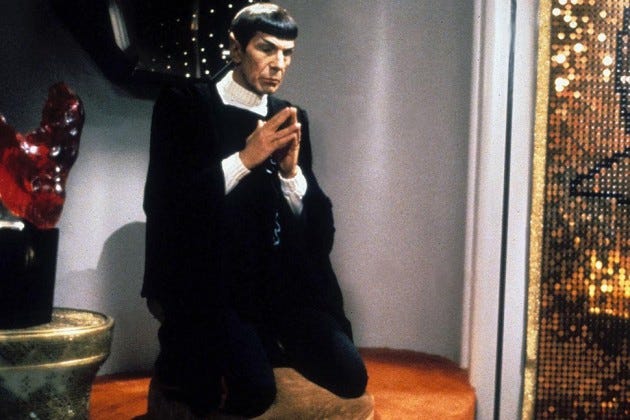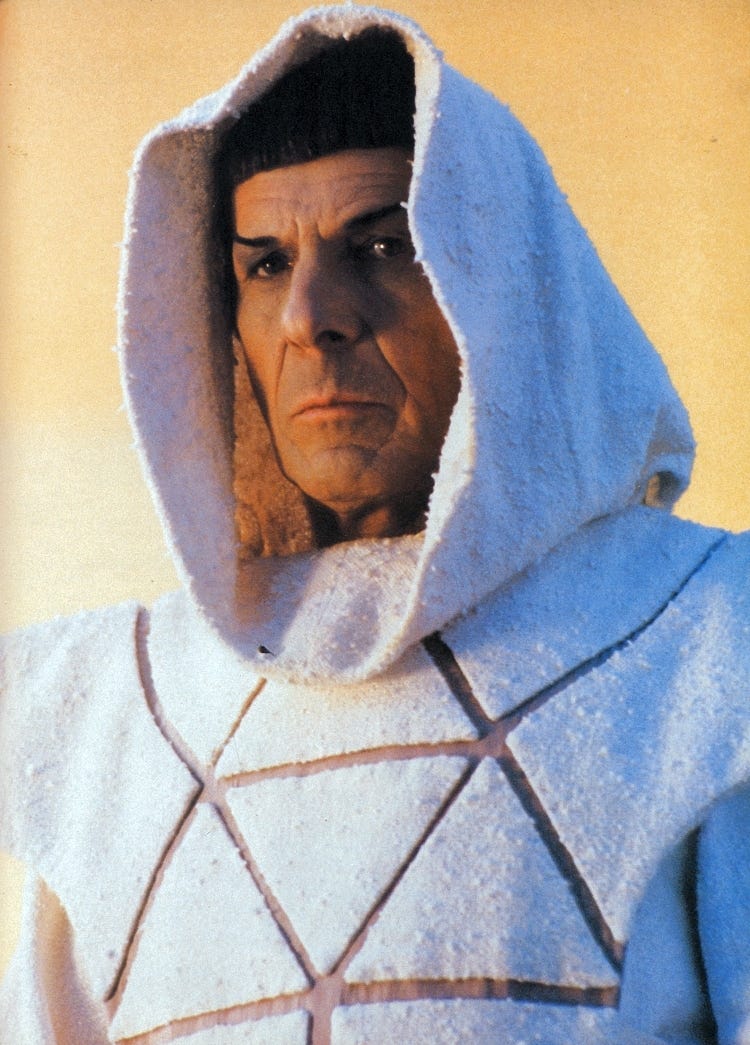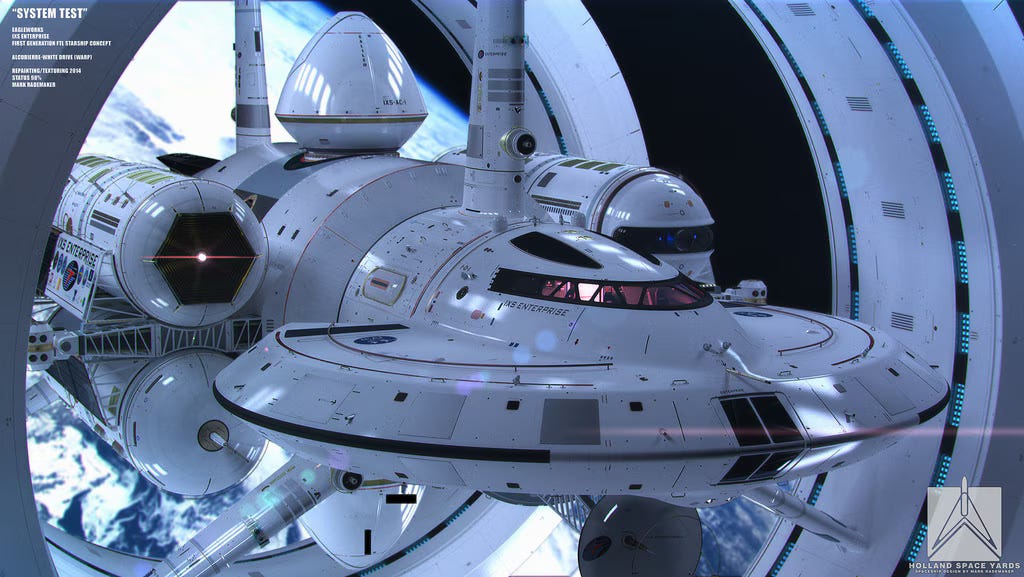Gene Roddenberry, the creator and writer of the fabulously successful 1960’s science fiction series was a womanizer, drug addict and secular humanist. He was banging both Uhura and Nurse Chapel during the early episodes, while still married with two children.
Now that I have your attention, I hope that I don’t ruin your love of Star Trek in the process of this article, because it really was an epic groundbreaking series that produced decades of spinoff movies, books and series.
Star Trek is set in a visionary society in the 23rd century, where a world government rules the Earth, administered by an even broader United Federation of Planets. Roddenberry inserted an anti-war message into Star Trek and depicted the United Federation of Planets as an ideal, optimistic version of the United Nations.
The issues that were depicted in the various series include war and peace, personal loyalty, authoritarianism, imperialism, class warfare, economics, racism, religion, human rights, sexism, feminism, and the role of technology. Roddenberry stated that, by creating “a new world with new rules, I could make statements about sex, religion, Vietnam, politics, and intercontinental missiles. Indeed, we did make them on Star Trek: we were sending messages and fortunately they all got by the network.”
SPOCK MESSIAH
The most memorable and influential of all the characters in Star Trek is undoubtedly Spock. His pointy ears, greenish skin and half-human, half-Vulcan pedigree were fertile soil for Gene Roddenberry to explore many social issues. Spock’s inner Vulcan angst is examined in many of the early episodes, and in later full screen movies, as the audience watched Spock battling his inner human demons.
The character of Spock is a transhuman personification of the ubermensch that the Great Reseters, like Yuval Harari envision for humankind’s future—a cold emotionless, computer-head godman:
“In the near future, humans will be able to upgrade their bodies and minds with advanced technologies, and eventually, Homo sapiens will evolve into Homo deus—a new species that will be capable of controlling the entire planet.”
Spock portrays the archetypical atheist scientist in his position on the Enterprise as 1st Science Officer. He makes clichéd commentary on “illogical” humans who are guided by their emotions and make cloudy judgments. His character is masterfully counterpointed by Dr. McCoy, Kirk and Scotty—the ongoing verbal jousting between the characters is used to explore and contrast Spock’s Vulcan nature with that of humans, who are always portrayed as a subspecies of physically weaker, irrational and violent noobs, in comparison to the superior Vulcans.
The Vulcans in their ancient past were a war-like people, and they were forced to master their emotions or face self-extermination. The underlying message is that man must overcome his dependency on human passion and evolve into the godman Spock who is both superman and evolutionary transhuman.
In Roman mythology, Vulcan is the god of fire, volcanoes and metalworking. He is often depicted with a hammer, and represents our mastery of fire, energy and technology. In the history of Star Trek, the Vulcan race made first contact with Earth after World War III devastated the planet, and the Vulcans offered assistance and helped Earth eliminate poverty, war and crime within a century.
Vulcans are vegetarians, though were omnivorous in their violent past; they use meditation as a method of coping with stress and they are depicted as smarter, physically stronger and living longer than their human friends. Vulcans are able to use telepathy and can read minds through the technique of “mind-melding.” The often-repeated Buddhist overtones of meditation and mind control are also interwoven into the scripts—and this again reinforces the non-theistic philosophical theme of the series.
Subtly interwoven in the script is the theme that humankind must overcome their outdated religious beliefs in order for the human race to evolve. At one point, in the Vulcan past, a great philosopher named Surak advocated the use of logic over emotion and the Vulcan’s polytheistic culture was transformed overnight in what is known as the Great Awakening. They gave up on primitive beliefs and embraced secular humanism (secular vulcanism) that relied on the intellect and the recourse to logic and reasoning which set them free, and saved them from the so-called self-deception of religion.
This is pure Enlightenment ideology. I explored the roots of this in an earlier post:
Over the course of the next few movie spinoffs, Spock’s status as Secular Messiah is explored: he dies and is resurrected, implanting his living energy into McCoy and is reborn a child on a planet which has been formed using a “Genesis” device which can create life by reorganizing matter. The genesis theme is also tossed in to portray the common belief among modern atheist scientists, that life can be created by human beings without the need for a Creator.
Spock’s death is a selfless sacrifice to save the Enterprise—his final words being, “the needs of the many outweigh the needs of the few, or the one.”
Spock’s later appearance in Star Trek movies witnesses him wearing saintly robes and defying time by visiting his younger self and giving the younger Spock advice. This is a mirror of the visitations of Jesus after his resurrection to the small group of early disciples.
Spock epitomizes and embodies the secular humanism of atheistic science, whose central belief is that man will outlive religion and God. Humans will self-evolve into a techno-god who triumphs over all worldly problems, even death. The irony that the Star Trek franchise uses religious symbols, themes and values, notably the altruistic self-sacrifice of Spock, and his death and resurrection, to promote atheist dogma should not be missed.
Star Trek can then be seen as a utopian morality play that champions atheism, borrowing many of the themes of its arch-enemy religion, for its own purposes—revealing the emptiness of its own value-system, that finds it necessary to borrow the same themes and symbols that it argues against, in order to promote itself.
OPERATION WARP SPEED
In 2020, the Trump administration’s project to develop a vaccine to protect against COVID-19 was named Operation Warp Speed, which was suggested by a Star Trek fan, Peter Marks, who led the unit at the Food and Drug Administration which approves vaccines and therapies. From a New York Times article on the subject:
“Operation Warp Speed got its start in April, the brainchild of Dr. Peter Marks, a pencil-thin, bespectacled physician who leads the regulatory unit at the Food and Drug Administration that approves vaccines and therapies.
A “Star Trek” fan, Dr. Marks named the initiative Warp Speed and pitched it in an April 10 phone call to Alex M. Azar II, the secretary of health and human services, who quickly embraced it.”
The influence of Star Trek on NASA gained strength over time—the first NASA orbiter shuttle, Space Shuttle Enterprise, was named after the USS Enterprise of Star Trek fame. The IXS Enterprise, NASA's conceptual design for a superluminal spacecraft, was similarly named after the USS Enterprise in 2014, with the mind-boggling goal of achieving warp speed (faster than light space travel.)
Nichelle Nichols (Uhura) appeared in a promotional film aimed at recruiting women and people of color to apply to be astronauts. NASA Administrator Bill Nelson commented on Nichols in a statement:
“Nichelle Nichols was a trailblazing actress, advocate and dear friend to NASA. At a time when Black women were seldom seen on screen, Nichelle’s portrayal as Nyota Uhura on Star Trek held a mirror up to America that strengthened civil rights,” said Administrator Bill Nelson. “Nichelle’s advocacy transcended television and transformed NASA. After Apollo 11, Nichelle made it her mission to inspire women and people of color to join this agency, change the face of STEM and explore the cosmos. Nichelle’s mission is NASA’s mission. Today, as we work to send the first woman and first person of color to the Moon under Artemis, NASA is guided by the legacy of Nichelle Nichols.”
One of the most dominant themes of Star Trek is diversity, equity and inclusion. The crew of the Enterprise were intentionally multi-racial, as per Roddenberry’s vision. Sulu was Japanese, Uhura was African, Chekov was eastern European, and other groups were often represented. The Jean-Luc Picard version of Star Trek was likewise diverse:
Noticeably absent from all Star Trek series are depictions of Muslims. The inherent racism of Star Trek is evident in the portrayal of America’s arch-enemies, the Romulans and the Klingons, who represent Russia and China. This is parallel to the covert racism of the World Economic Forum who fully support Israel’s ongoing massacre of Palestinians in Gaza. Likewise, America’s invasion and bombing of the Muslim world continues since the so-called Global War On Terror was launched with the full approval of the WEF. It is actually an American War On Islam.
THE GOOD, THE BAD AND THE UGLY
The ideology of the Enlightenment is the inspiration for Gene Roddenberry’s Star Trek. This is not a complete non-starter. The liberal values of the Enlightenment produced our modern civil rights and democratic freedoms. The Enlightenment thinkers, like Voltaire, Rousseau, Diderot, D’Alembert and D’Holbach met in the salons in France and opened up a dialogue on the right of kings, separation of church and state and the need for a new social contract.
They revolted against the totalitarian Christian Church, who had a virtual monopoly on all civic life in Europe. This Secular Revolt triggered both the French and American Revolutions because citizens demanded greater political, economic and social freedom. They also wanted a more fair and just society, where the rights of all were recognized, whether rich or poor, male or female, free man or slave.
The preamble of the American Constitution is a succinct summary of these desires:
“We the People of the United States, in Order to form a more perfect Union, establish Justice, insure domestic Tranquility, provide for the common defence, promote the general Welfare, and secure the Blessings of Liberty to ourselves and our Posterity, do ordain and establish this Constitution for the United States of America.”
The difficulty of the Secular Revolt lay in its overt rebellion against, not only the Church, but also God himself. The Enlightenment produced militant atheism, a new breed of terror that continues to this day to assert itself.
The scientific revolution had its roots in the Renaissance, but it was the Enlightenment that fully triggered the explosion of science and technology that gave us the marvels of our modern society. These marvels are mostly taken for granted now, but we should think back to the short, rude lives that men and women lived for thousands of years before we pass judgement on the supposed evils of technology.
Despite the great gains the Secular Revolt made in civil rights and freedoms, it also triggered the unintended consequences of world wars. The last century witnessed horrific violence, on a scale never before seen on Earth.
The alternative community’s fears of a one world government may be eclipsed by another world war. There will not be any world government if the human race wipes itself out, and there is no reason to conclude that it will not happen. The human race learned nothing from the two world wars.
Until there is a return to the refreshing waters that inspire the human race, there will no end of wars. We cannot survive without God, whether modern men and women care to admit it or not.









We should be so lucky as to live in a society like the Star Trek one. What is the MAIN difference between the semi-communist utopia of Star Trek and the "Great Reset"? In Star Trek there doesn't seem to be any kind of global ultra-corporate powers, or major private-public forces, making the decisions, and society seems to really have less inequality, between the have-somewhat (in Star Trek) and the have-a-lot. Also, in many cases, episodes, movies, the idea of a spiritual realm or dimension, is not insulted, and there is a strong whiff of tolerance.
Also, in sci-fi terms, it is a post-scarcity society, so it is essentially a somewhat-communist society. Of course, Star Fleet is the convenient pressure valve available to shift dissenters into a productive career... 😆
I grew up watching star trek with my family. It actually started to take over in the sense that we would decline and events or social gatherings if it was on show night... Eventually I stopped watching t.v altogether after seeing the power that a television series could have over a family. I ve never looked back at the symbolism until now with reading your article. My dad is an atheist and mom came from a Christian family but ditched her faith to be with my dad. No wonder he loved the show so much! It probably also help foster his non belief further.
I agree with you! We need the most High, the Holy One for Yah is love,
Our Rock and salvation, our peace,
Strength and health to our bones.
Witnessing the beauty and wonders of his works is the only show I need !